One of the best things to do in Athens apart from visiting the Acropolis and the museums, is to get to know the Central Market of Athens (Athens’ Food Market) and discover the Greek food culture at its best.
Why visit the Athens’ food market during your trip in Greece?
Nothing can compete with the vibrant atmosphere of Athens’ central market, a living “monument” operating non stop for almost 150 years. Coming here is a great opportunity to uncover the true taste of Greece as a curious traveller away from tourist traps. Get a sense of the local life and immerse yourself in the daily rituals of the Athenians. Let them introduce you to their favourite playground with a game of sights, sounds, aromas and flavours, that can offer to you a huge source of culinary inspiration.

What is the story of the Athens Central market?
The public market place of Athens takes over the whole block between Evripidou, Athinas, Sofokleous and Aiolou streets. It is separated into two parts; the covered market that consists of the fish and meat market and the open-air fruit and vegetable market on the other side of Athinas street. Construction started in 1878, but it was not until 1886 that the market started officially operating.
During Ottoman times, the old upper bazaar was the centre of the city comprised of wooden sheds, where people would gather to shop and socialise as well. A tremendous fire destroyed the old market, so the merchants had to move to the new, unfinished market already in 1884.
Athens’ Food market “Dimotiki Agora” (Municipal Market) fulfilled the city’s need for a permanent, indoor market, built to European standards. Varvakios market is how the locals call it.
The name comes from Varvakis, a former pirate who turned into Greece’s benefactor and national hero. During his adventurous life, he became a prominent member of the Russian court and made a great fortune from exporting caviar around the world from the Caspian Sea. When he died, he donated a big part of his fortune to the state, in order for a public, fee-less high school to be built, the Varvakion Lyceum that existed till the war across the market.
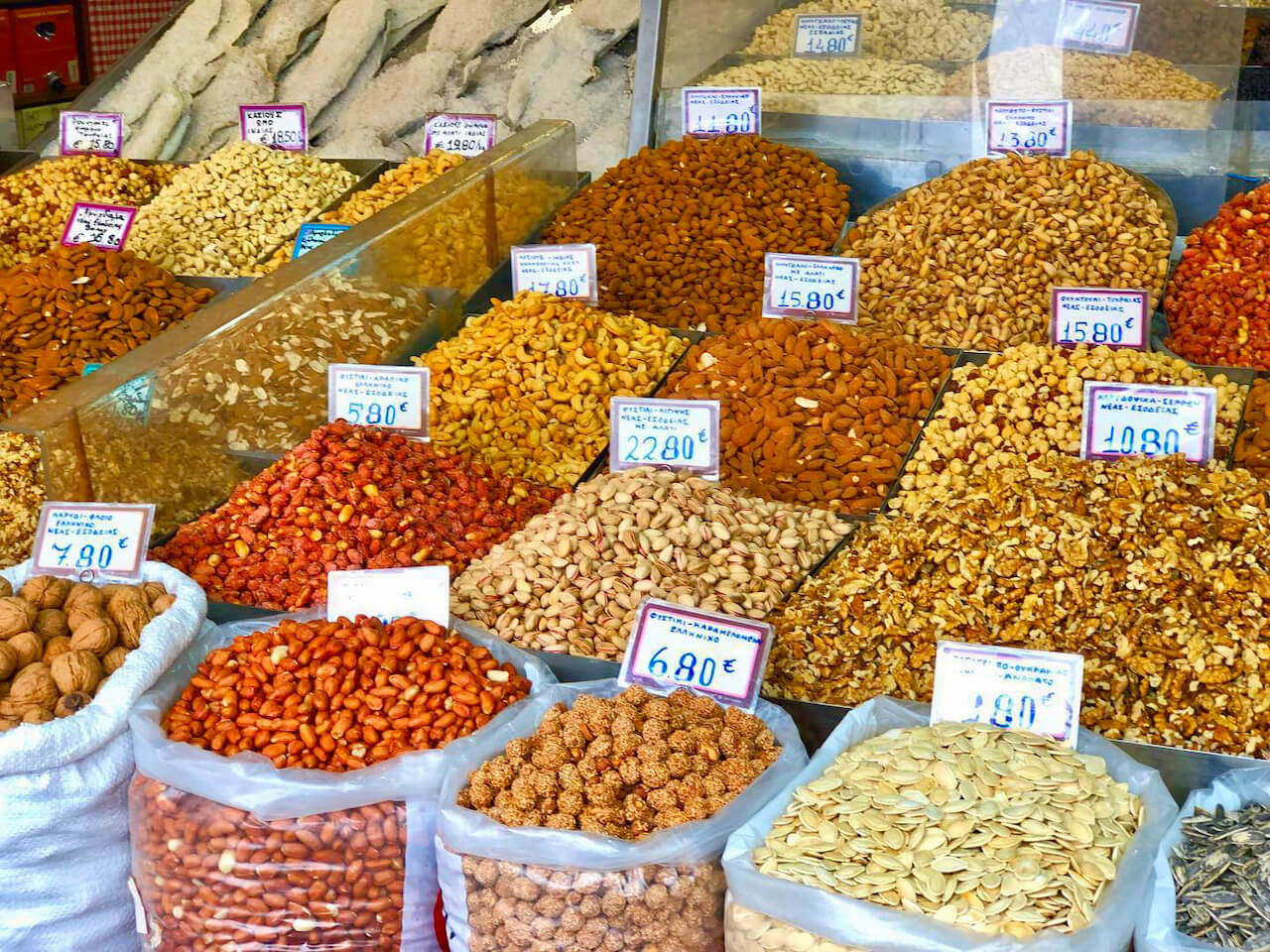
Visit the meat market of Athens
This is the heart of the commercial centre of Athens, trusted by locals and chefs alike. Comprised of old and new businesses, some of the owners started their career here as errand boys.
The meat market underwent renovation before the 2004 Olympic Games with new refrigerated glass cases at the front and refrigeration at the back to comply with EU hygiene standards. But still, this is not the place for the “fainthearted”.
All sorts of meats are on display on marble counters and hooks, even “inferior” cuts like intestines and tripe, which for the Greeks are considered delicacies, and even less popular ones like rooster and rabbits. Most businesses are preferred for a specific kind of meat, among others, butcheries known for their exquisite lamb and others trusted for premium aged beef and carpaccio hand cut on the spot.
Locals come here because they ‘ve built relations of trust with the vendors, who freshly-cut or grind the meat in front of their eyes and advise them on what parts to prefer for their recipes. In the past, Athenians flocked the market on Saturdays to prepare for their Sunday meal, usually the only day they could afford meat and had to buy it fresh due to the lack of refrigeration.
The meat market (inside Athens Central Market) reaches its peak during Easter, where people come here to buy their traditional lamb on the spit, and Christmas time for their pork (or westernised turkey). This is when newscasts come to report the market’s pulse and ask consumers their opinion on this year’s prices.
The sounds, the shouting, the teasing are all part of the game, so you can either embrace it or ignore it.
Tip: Look up on the magnificent domes of the market which host a photographic installation with children inspired by a Baroque cathedral.
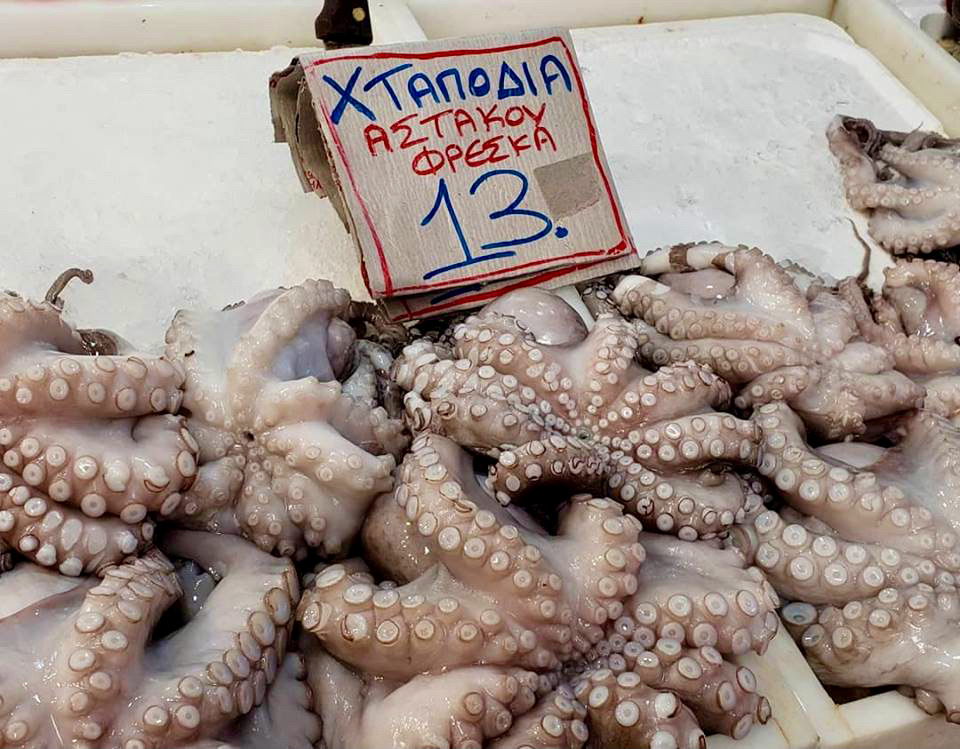
Experience one of the biggest fish markets in Europe
Walk down one of the Athens’ food market’s sideways, and on its adjacent alleys a whole different world comes to life. The diversity of fish and seafood in Athens Central Market is unlike anything you’ve ever seen. The fish stands overflow with wild or farmed fish for every taste and budget; sea breams, sea basses and red porgies, locals’ favourite red mullets, scorpion fish exquisite for soups, eels, grey mullets sold for their precious eggs; “avgotaracho” (bottarga), humble sardines and anchovies to fry or marinate, premium groupers and tuna for grilling, even a type of local dog fish called “galeos”.
Seafood is abundant too. If you come to Athens’ food market (Fish) on Clean Monday (the first day of the Great Lent), you will witness the locals selecting the best from a cornucopia of octopus, calamari, shellfish, cuttlefish, shrimp and crayfish. Some come from the night before to prepare for their festive picnics or family tables.
Tip: Wear comfy shoes for the floor gets slippery from the water sprayed on fish to look fresh and shiny. Feel free to capture with your camera the wonders of our seas (vendors will be friendly and playful as long as you are not rude and intrusive).
When to visit Athens Central Market
Catch the action from Monday through Saturday. Get ready for the crowds, especially during the weekend. Opening hours are from early morning till late afternoon, except Sundays, but we always suggest visiting in the morning.
A few years back when the market was open for longer, restaurant owners used to come here after work in the wee hours to take care of their supplies before going to sleep.
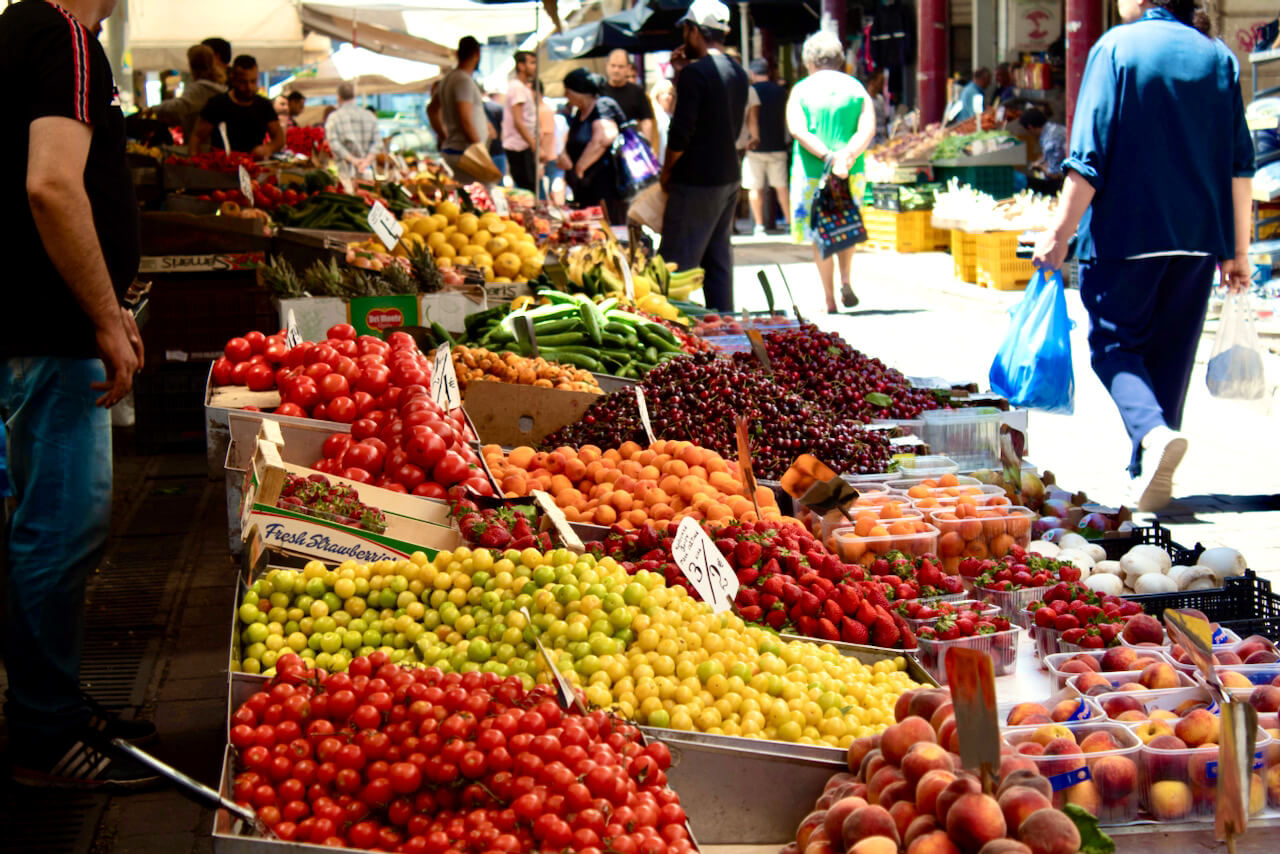
Marvel the colours of the Athens Fruit & Vegetable market
Right outside the Athens Central Market, street vendors sell their foraged goods; wild greens, herbs and snails in the spring, green lemons in the fall, sweet figs and prickly pears in the summertime,
In the wintertime you will find vendors with their carts on wheels selling “salep”, a hot beverage made of orchid’s root flavoured with ginger and cinnamon, known for its soothing properties.
Cross Athinas street, and you will find yourself to the kaleidoscopic world of Athens’ fruit and vegetable market. Athinas street is one of the oldest commercial streets of the city, the “street of wonders”, a name owed to the variety of magic potions that were once on offer.
You will notice that the street is relatively wide for Athenian standards, adorned with impressive jacaranda trees in full bloom at the end of spring. The reason behind is that Athinas was destined to be a “boulevard”, offering a lovely walk for the king and queen from the Palace in Omonoia sq. to the Acropolis. The Palace was eventually built in Syntagma sq., but at least we have this beautiful street left.
The colourful fruit and vegetable market completes the Varvakios “trilogy” and it’s the next best thing you can do if you cannot visit one of Athens’ farmers markets, called “laiki” to enjoy the delectable variety of locally grown produce from Greece.
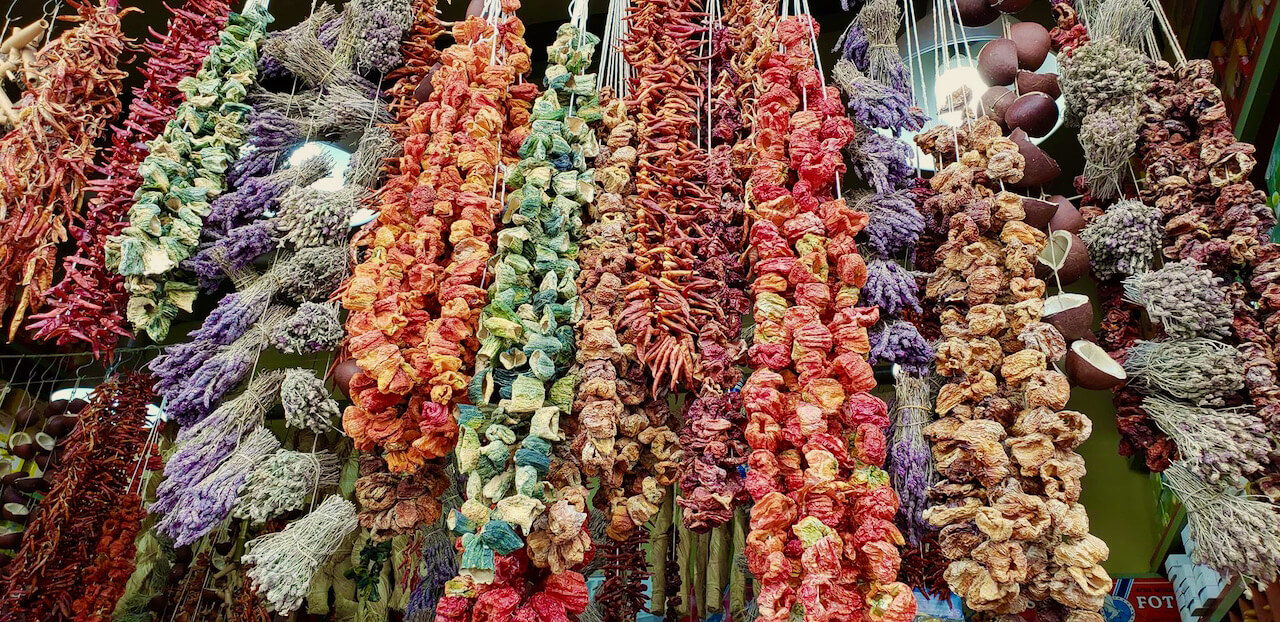
Take in the smell of herbs and spices in Evripidou street
Evripidou is the fragrant Mecca of home cooks, chefs and especially older people who come here often to relive childhood memories of the smells, the images and the tastes of Athens’ most aromatic street. For them, coming here even from far away is not a chore; on the contrary, it is their elixir of life. It’s their way of socialising, forget their worries, sit down for a coffee or tsipouro with meze, before heading back home to their routine.
We suggest you do it like the locals; explore the little shops of Evripidou str. and look for its hidden delights, take in the sweet smell of spices wafting in the air and buy some to recreate Greek recipes back home; when you cook, the aromas will evoke the feeling of your Greek holidays.
Evripidou was declared as “traditional commerce” area in 2012, meaning it is allowed to keep the unique character it became known for. At the beginning of the 20th c., Greek and Armenian refugees from Asia Minor arrived here and started a lucrative business. They sold herbs and spices they used in their kitchens and changed once and for all the tasty but then unsophisticated Greek cuisine.
A feast for the senses, Evripidou is near the Athens Central Market and it’s jam-packed with local goods; soothing herbal teas, like the therapeutical Greek mountain tea, sweet scented cinnamon sticks, allspice and clove, whole bunches of oregano, savory and thyme for your Greek bbq rubs, holy incense and essential oils, natural cosmetics made with pure olive oil, delicious cold meats, like soutzouki with cumin and pastourma covered in fenugreek, garlands of dried vegetable to decorate your kitchen, sacks of legumes for your vegan stews, dried fruit and nuts for your granola; everything you are looking for in a huge variety and affordable prices.
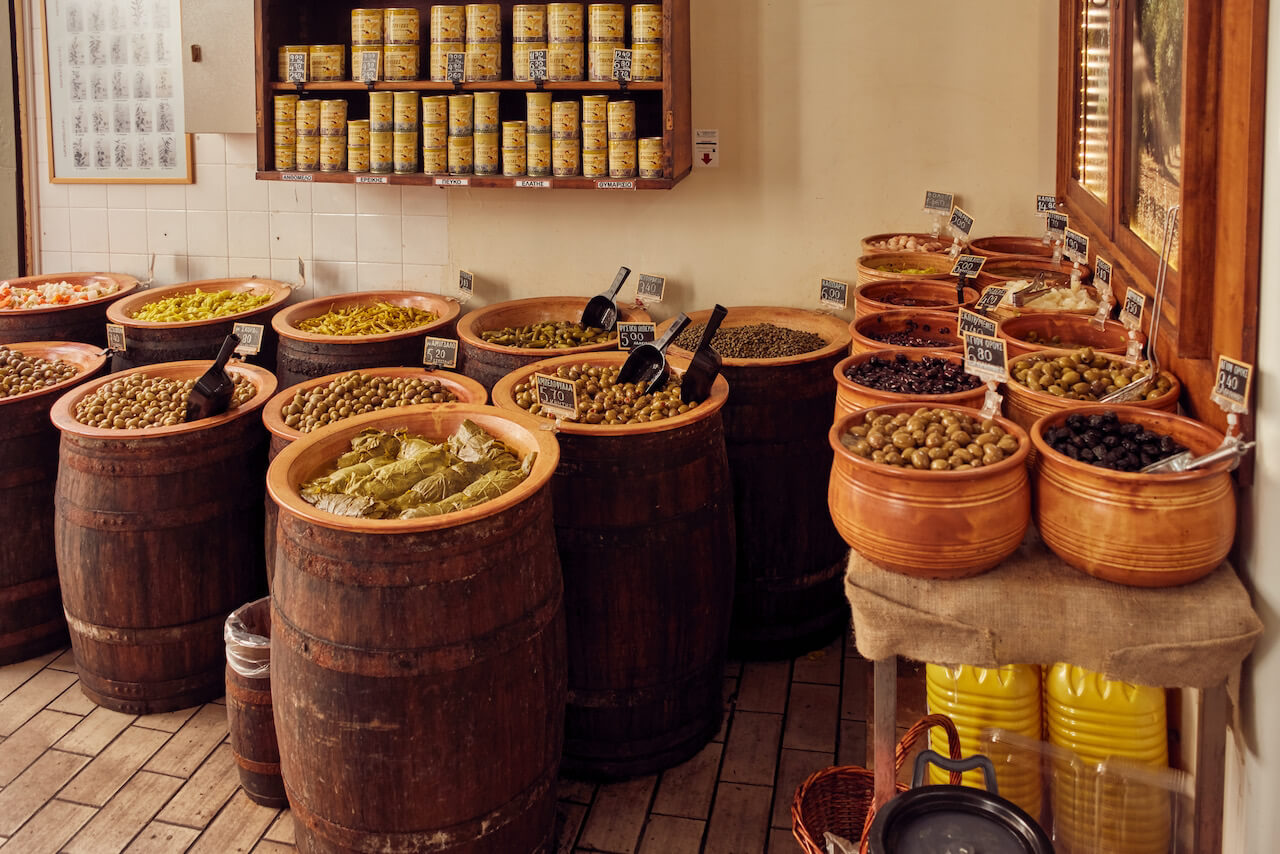
Where and what to buy around Athens Central Market
In this culinary paradise of artisanal products, traditional delights and gourmet delicacies, it’s hard to know where to start from. Therefore, we’ve compiled for you some of the best places to buy your edible souvenirs around Athens Central Market.
Kolios has an unbelievable variety of Greek honey, traditional desserts like halva from tahini, cookies from carob molasses, delightful loukoumi and also sourdough bread with turmeric.
In Miran you will find the Armenian experts of soutzouki and pastourma since 1922 in a treasure trove of delicacies with a beautiful vertical garden on the outside. In Zarkadian, its friendly owners will welcome you with a delight of cured meats, excellent feta cheese, yogurt and herbs from their place of origin – make sure you try before you buy.
Excellent feta you can find right across the street in Strougka tou Moria from the Peloponnese or in Karatzas right on Athinas str. Ariana is trusted for its local olives since 1921, -don’t miss the green cracked olives from Megara and their wide variety of Amfissa olives from their homeland. Look no further than Peri Lesvou to get yourself a bottle of ouzo or mastiha liqueur from Chios island.
Our favourite shops in Evripidou are Fotsi for the spices and Elixir, loaded with an array of Greek herbs, used by locals for ages as natural remedies and To fthino ypogeio, a basement full of beans and grains which make up the basis of our Greek diet.
Last but not least, visit Polykalas to buy Greek liqueurs as souvenirs in pretty little glass bottles, – don’t leave without trying their exquisite hazelnut liqueur.
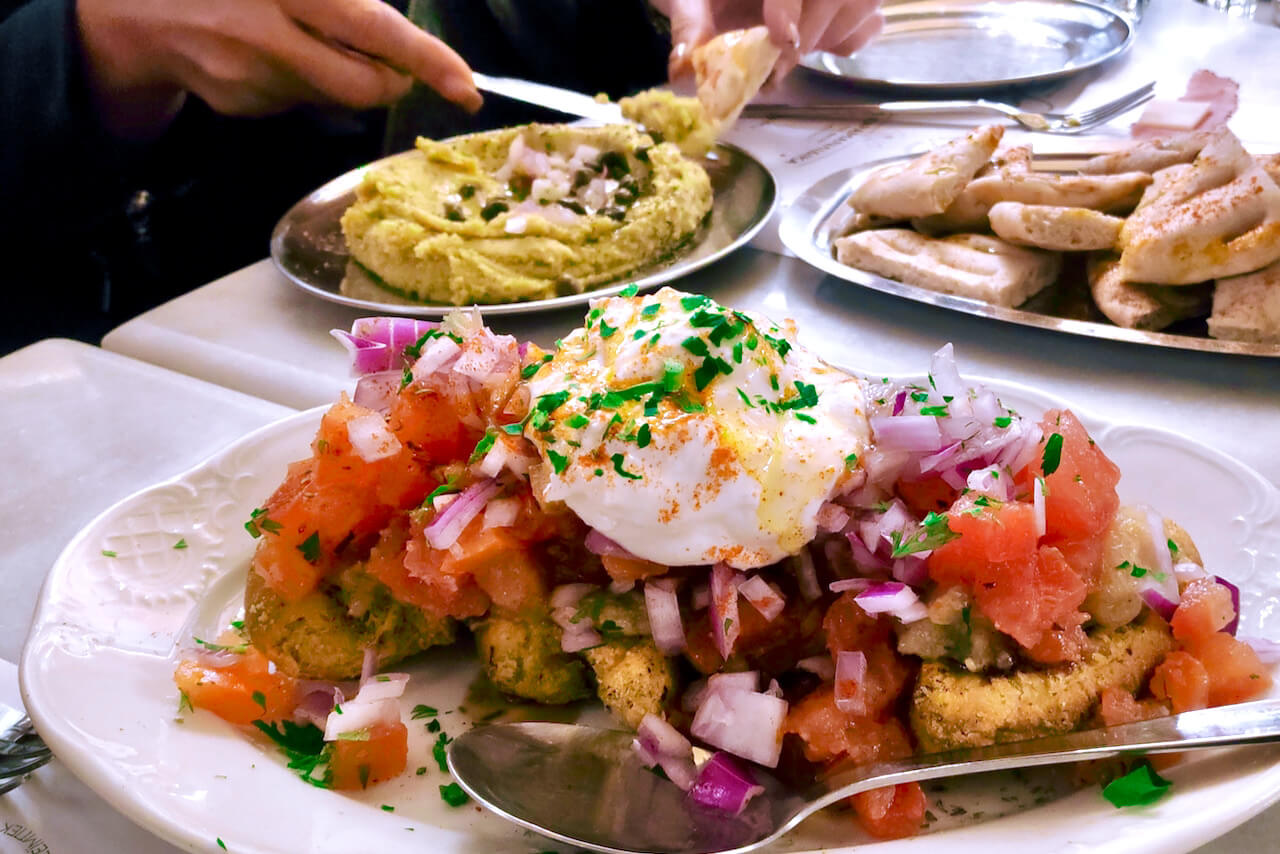
Where and what to eat around Varvakios food market
Visiting the market will surely whet your appetite for more delicious Greek food. This is where you will find the most authentic Greek cuisine coexisting in new and old places, some considered as Athens’ institutions, in business for almost 100 years.
Inside the meat market (in Athens Central Market), you will find Ipeiros, an unassuming “mageireio”, the go-to-place for comforting soups and “mageirefta” (slow cooked Greek dishes). Two days per week it caters for the night owls of the city and late night workers, serving them “patsa”, which is the Greek version of tripe with garlic, vinegar and chilli flakes (boukovo), the local hangover recipe.
Right at the end of “Stoa Athanaton” (Immortals’ Alley as translated) you will find the no-frills fish tavern Aris to try charred octopus, fried calamari or red mullet, – you can even bring them fish that you like from the market and they will cook it for you at a small cost, as long as you order a few other dishes as well.
Karagiannis, is the locals’ “steki” (hangout) for a simple meze platter, with little “tapas” bites of marinated anchovies, meatballs, dolma and fried cheese, the perfect accompaniment for your cold beer or tsipouro.
Newer establishments complement the market’s food scene; Volvi has a small menu but enough to fill up your belly with delicious souvlakia (meat skewers) and soutzoukakia (oblong-shaped meatballs) and Hasapika, the city’s latest sushi place offering nigiri, sashimi and ceviche with fresh fish straight from the market.
When it comes to coffee, there is no other place to get your caffeine fix than Mokka. At this old-fashioned “kafenio”, you can enjoy Greek coffee made on hot sand or relish our cold coffee fixations; the freddo espresso or freddo cappuccino (with milk foam on top).
Right at the back side of the Athens Central Market, visit Krinos, the sweet landmark of our city, feeding generations of Athenians with Greek donuts for the last 100 years.
On the other side of Athinas str., behind the fruit and vegetable market, the “treasure hunt” of Greek traditional flavours continues. Just stop by one of Athens’ time capsules like Diporto or Klimataria to see how old Greek tavernas looked like in the past, when the owners put barrels on the walls and served their own wine from Mesogeia ( in Attica region around Athens).
In the same area, Tis Theatrou to Steki serves simple, unpretentious meze in good prices. If you are a big company, share some of their small dishes on the table, but if you are just the two of you, go for their combo plate with either fish, meat or vegetable mezedes.
Karamanlidika is where the Greek meze culture is much celebrated, with Cappadocian inspired recipes served in a delicatessen and open kitchen full of tantalising delights.
In the wider market area, you will tempt your taste buds with delicious meats. Go to Telis for scrumptious pork chops, served with a spicy tomato-feta appetiser, like bouyiourdi (check out n.14 on the list), Lefteris o Politis for pure, authentic beef burger or spicy soutzouki wrap, or Avli, our secret backyard in Psyrri for meatballs and cold beer.
In Greece, yogurt is also eaten as a dessert at the end of a satisfying meal. Don’t leave without paying a visit to our nostalgic dairy bar Stani for delicious, gut-friendly yogurt drizzled with honey and walnuts.

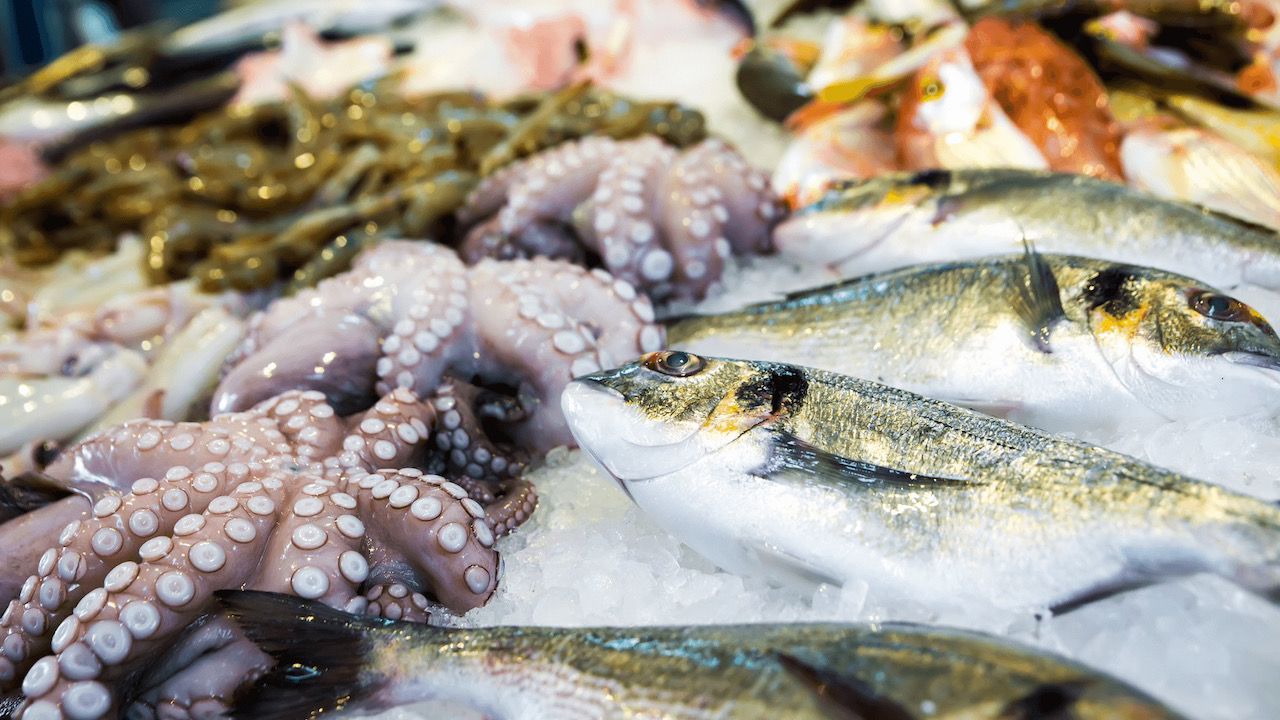
Comment (1)